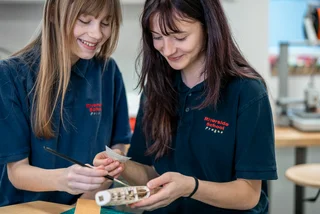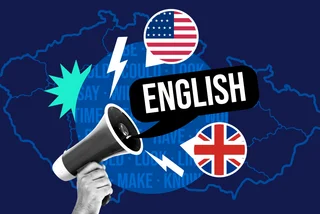You’ve taken Czech 101 and can now order cocktails and deli meats with some proficiency. But when the conversation is flowing—at the office or pub—you feel intimidated, lost, and, ultimately, frustrated. Sound familiar?
You’re probably forgetting one simple rule says Pavla Vraspírová, head teacher and coordinator of Czech for Foreigners at Archimedes Language Academy, one upon which proficiency in Czech, or any other language for that matter, hinges: Speak it often. And fearlessly.
PARTNER ARTICLE
“It’s important to start living—not just learning—the language,” says Vraspírová, who knows from personal experience. “I spent six months at Universidad de Santiago de Compostela in Spain and even though I never studied it, just by listening to people speaking I was able to understand and communicate in Galician.”
While not everyone may share her aptitude for languages, there are still some easy things you can do right now to improve your ability to speak Czech without going to a single class.
Here, Vraspírová’s tips for taking your Czech to the next level:
15. Read children’s books.
Did you know that reading exposes you to more sentences per minute than watching television or films? Beginners can start with children’s books, especially ones you know well in your native language. Audiobooks with accompanying text will help acquaint you with Czech cadence.
14. Decide if you’re a visual or aural learner and proceed accordingly.
If someone gives you his telephone number do you remember it? Or do you need to see it written out? Those who answered “yes” to the former are aural learners and should focus more on listening to Czech and reading it aloud. Those who answered “yes” to the latter are visual learners; labeling and writing things may be better learning techniques for you.
13. Host or attend a Czech games night.
Board games and card games build vocabulary, grammar, familiarity with common expressions, numbers, counting, colors, and more. Play an old favorite in Czech (such as Uno) or try a traditional Czech game like Prší, commonly played in pubs. If you really want to get into the spirit, order the Czech version of Life or even check out Prague’s free poker league.
12. Do a daily power hour.
Study intensively, for at least an hour daily. Like an exercise regimen, if you can’t manage to fit in a full 60-minute block of time, it’s perfectly fine, and may even prove more productive, to break it down with vocabulary in the morning, writing in the afternoon, and listening in the evening, for instance, for a total of one hour.
11. Label every last surface.
Not only will doing so improve your vocabulary, but labeling works for verbs as well (truly the most crucial part of the sentence, along with proper word endings; use these correctly and you’ll be understood much better). Mark your TV “televize” with “Dívám se na televizi” written beneath.
10. Always (really, always!) carry a dictionary.
From billboard ads to cafe menus, look up any unfamiliar words as soon as you encounter them. Once you’ve learned a new word, use it right away and repeatedly. Carry a notebook, too, for faithfully jotting down all of that new vocabulary!
9. Memorize key words and phrases.
Phrases like “Jak se řekne…?” (How do you say…?) and “Co znamená…?” (What does … mean?) are gold to non-native speakers. Use them, and others, repeatedly until they are firmly anchored in your head. Learning the 100 most common Czech words and Cz-Eng cognates will boost your Czech, too.
8. Make phone calls in Czech.
Ask your Czech-speaking teachers, friend, or colleges to give you a ring instead of the usual SMS or e-mail (though texting and writing e-mail in Czech is great practice, too). You’ll not only enhance your listening skills but be forced to express yourself without relying on hand gestures and other non-verbal forms of communication.
7. While you’re at it, switch your phone settings to Czech.
Anything that forces you to think, read, and write in the target language will undoubtedly encourage your developing Czech skills. Changing the settings on your computer—though frustrating at first—will have the same affect.
6. …Facebook, too!
Switching your Facebook language settings to Czech will, through repetition, teach you common phrases like “To se mi líbí” (I like it) while enabling you to observe many varieties of declinations and conjugations. You’ll also get used to thinking in the target language.
5. Adopt the local body language.
50-80% of all communication is non-verbal. Learning common Czech hand gestures, and paying attention to things like volume and intonation will also help you communicate better. That means ordering “dvě piva” with your thumb and forefinger, not the index and middle one, for example.
4. Date a Czech.
By far one of the most fun—if more drastic—ways to improve your Czech skills is to make a date with a Czech, preferably one with plenty of patience. Romantic encounters not only serve to foster foreign language learning, they also get you out of the expat bubble, itself a common hindrance to learning Czech.
Read our article about Czech online-dating and try your hand at chatting with some local ladies or gents.
3. Give yourself a good talking to.
Make up dialogues or monologues and practice them at home alone in front of the mirror or even on public transport—if you don’t mind the stares. In all seriousness, talking to yourself is a great way to work on your Czech; read aloud from a Czech book or magazine for pronunciation practice, too.
2. Shop, cook, and dine in Czech.
Write your grocery list in Czech; browse food magazines for simple recipes to try (not only is this a good way to practice food vocabulary and associated verbs, but you’ll also use the genitive case repeatedly). Devote one meal a week to Czech table chat with family or friends.
1. Stop thinking in English.
Constantly translating everything back into English is sure to hinder your progress in Czech. While it’s great that you know that “table” is “stůl”, it’s even better to know that “stůl” is where you’re eating breakfast. Imagine the thing itself, not the word. Once you stop thinking in English, you will be on your way to fluency!
If you’re considering a course to learn the Czech Language, you can find a great selection right here.
How do you make the Czech language a part of your daily life?












 Reading time: 5 minutes
Reading time: 5 minutes 





















